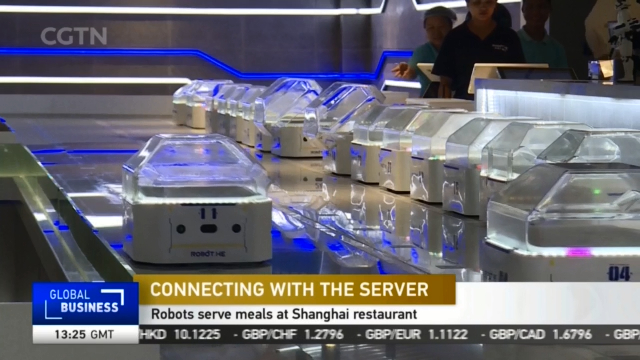
22:49, 09-Aug-2018
Connecting with The Server: Robots serve meals at Shanghai restaurant
Updated
21:57, 12-Aug-2018
02:12

The artificial intelligence and robotics industries are booming in China. Offering first-hand evidence of this, a restaurant in Shanghai is using robots as waiters. They're about the size of microwave ovens and roll around the dining room on table-high runways. Customers use an app to place their orders. ZHENG CHUNYING has more.
Wheeling up to the table. Raising its glass lid to reveal your tasty dish. These robotic waiters are working at "Hema", a restaurant owned by Alibaba, part of the company's push to bring more technology to service and retail. Raising efficiency and lowering labor costs are among the key objectives.
CAO HAITAO, PRODUCT MANAGER "HEMA" ROBOT RESTAURANT "Staff costs are getting higher and higher, and in Shanghai, a waiter costs thousands or even more than ten thousand yuan (more than US$1,465 per month). This year the cost of one person alone could be more than ten thousand yuan, or some twenty or thirty thousand yuan (US$2,930-4,400). But the investment in the small carts is a one-time investment and their efficiency is about the same as that of people."
This builds on Alibaba's chain of "Hema" semi-automated supermarkets. Grocery shoppers fill their "carts" on a mobile app and have the merchandise brought to them at checkout via conveyors on the ceiling, or delivered straight to their homes.
Alibaba now has 57 Hema semi-automated supermarkets in 13 Chinese cities.
MA YIWEN CUSTOMER "Selecting dishes and placing the order is all done through the app, so it is quite convenient. The robots deliver the food -- there are no traditional servers. I think it's quite original. So these advantages make it really convenient and high tech."
It's becoming a trend in China to integrate artificial intelligence into commerce.
Alibaba's e-commerce rival JD.com has announced plans to open 1,000 restaurants by 2020 in which food will be prepared and served by robots.
JD.com and others are also working to incorporate airborne drones into their delivery networks.
Chinese AI advocates predict robots will someday perform a range of mundane duties as living standards rise, from deliveries to sweeping floors and providing companionship.
However, the automation wave also brings worries, especially over the potential for human job losses.
But it doesn't look like this wave is going to recede anytime soon.
ZHENG CHUNYING, CGTN.

SITEMAP
Copyright © 2018 CGTN. Beijing ICP prepared NO.16065310-3
Copyright © 2018 CGTN. Beijing ICP prepared NO.16065310-3